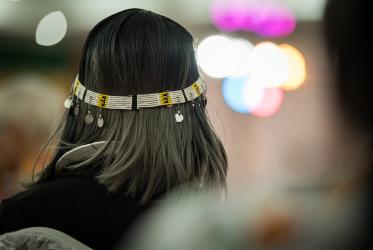From one ancestor he made all nations to inhabit the whole earth, and he allotted the times of their existence and the boundaries of the places where they would live.
Acts 17:26
Migrations also often have to do with the loss of lands, territories, there is no space to cultivate, where to build an identity, so the march is the consequence.
Latin America is the most dangerous region to defend territorial and environmental rights: those who resist the extractive expansion are criminalized, stigmatized, attacked and murdered, this sector being the one that is linked to the greatest number of conflicts that lead to assassinations.
Colombia and Mexico top the list of the countries with the highest murder rates against environmental defenders and guardians, according to the latest 2020 report of the NGO Global Witness 212 indigenous leaders between men and women were murdered they belonged to indigenous peoples of Mexico, Guatemala, Honduras, Peru, Ecuador, Mexico and Colombia.
Currently, 156 environmental defenders from Peru, Colombia, Mexico and Ecuador face legal proceedings to protect their territories, where in many cases the State is the complainant.
The community of wise indigenous theologians of Abya Yala (COSTIAY), which makes up 12 countries of our Latin America and of which I am also its representative, shared the experiences lived in each of their countries: the Mayan, Kaqchikel, Nahual, Zapotec, Aymara, Quechuas and Kicwa, both Andean and Amazonian as well.
This experience of COVID 19 has been historically and unfortunately with devastating consequences and at a disadvantage mainly for these populations, due to the inequalities, inequities of the government system because, in addition, the health systems not equipped without the basic resources to provide assistance have exposed the gaps. The two to three day trips to a hospital in search of medicines and oxygen have caused many of our brothers to cease to exist. But the indigenous peoples, surviving for millennia and centuries of oppression, despite these inequities, we have been able to maintain our health with elements that Mother Earth provides us and the ancient wisdom inherited from our ancestors that has once again been taken up, have helped to maintain our health and balance since we have resumed our way of life as the consumption of tea from trees, medicinal herbs, seeds, roots, fruits, leaves and flowers, honey have been the guardians for health in this time of pandemic.
During the confinement, there was also an awareness of resuming the implementation of home gardens, food security and taking care of the territory, although these have been curtailed by colonization processes and contaminated by extractive industries, they still offer immense potential to build our own autonomies, the ancestral wisdom to defend ourselves from diseases, and the constant mobilization in defense of the territory.
These strategies have helped us mitigate, to some extent, the impacts of the pandemic and extractivism. The participation of indigenous women in the care of our old men and women is fundamental in this time of pandemic because we ensure the transmission of this knowledge to the new generations. Young people, for their part, also contribute to the development of communities and can be protagonists of change. For this, it is necessary to provide them with better opportunities here in our territories and in terms of education so that they can contribute to the communities that demand the renewal of leadership so that indigenous youth can have an effective role in the governance of land and defense. of territorial rights.
So far, only a handful of governments have included them in priority groups for the vaccination process. Brazil, Paraguay, and Mexico have been included as part of the second phase of vaccination. Vaccination has been progressing since February in some indigenous communities, but other communities have expressed their rejection of the vaccine for fear of harm to them, lack of adequate official information and distrust of the government.
However, almost no country has consolidated specific strategies or assigned an adequate budget to improve the living conditions of this population, despite the fact that it has been one of the recommendations by the United Nations.
Meanwhile, the representative organizations of the indigenous peoples propose to carry out information campaigns on vaccination where they are involved. Along these lines, they warn that, if they do not articulate efforts with indigenous organizations, federations and health promoters, any information campaign will not achieve the desired impact, in addition to the fact that these information products are also available in indigenous languages.
Finally, we see with deep sadness and pain that the indigenous peoples continue to be the invisible ones, despite our great value and importance in the care and protection of the earth, biodiversity and the environment, governments, authorities, systems do not achieve see us.







